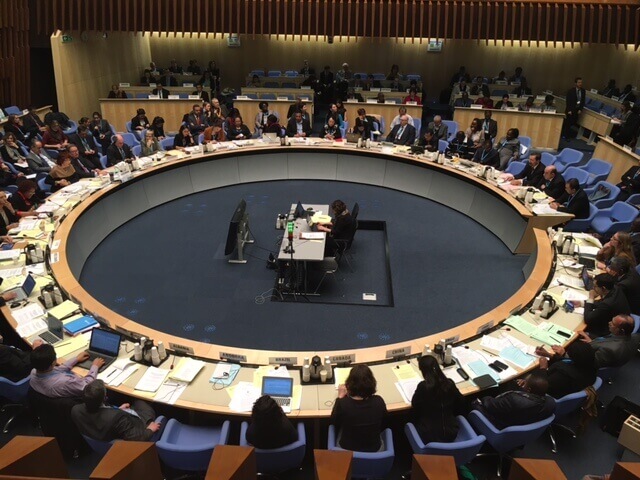Jana ArmstrongGHTC
Jana Armstrong is a consultant for GHTC who supports the coalition's multilateral advocacy.

Over 1,000 attendees, a longer than ever agenda—with time management by a song for punishment and a chocolate Caramello Koala as a reward—the 138th World Health Organization (WHO) Executive Board (EB), chaired with humor and efficiency by Precious Matsoso, Director-General of the Department of Health, South Africa, concluded Saturday, January 30 after six days of discussion and debate.
The main headlines were WHO emergency reform, WHO reform in general, the Zika response, transitioning from the Millennium Development Goals to the Sustainable Development Goals, universal healthcare, preparation for the United Nations (UN) High-Level Meeting on noncommunicable diseases, the upcoming UN General Assembly Special Session on the World Drug Problem, Framework for Engagement with Non-state Actors, Global Action Plan on Strategies for antimicrobial resistance (AMR), pandemic influenza preparedness, and promoting the health of migrants. The full agenda, associated documents and nongovernmental organization (NGO) statements can be found here.
R&D featured prominently on the agenda
The need for global health research and development (R&D) and access to global health technologies featured prominently in many of the agenda items addressed under Health Systems and Preparedness, Surveillance and Response including:
R&D was also embedded as an important point within some of the key headline items including:
The EB accepted all of these topics for inclusion in the 69th World Health Assembly (WHA) agenda.
A number of NGOs, including GHTC, weighed in on R&D and access related topics discussed at the EB meeting. Full NGO statements delivered at the meeting are available here.
Three resolutions related to health R&D introduced for WHA
Most of the EB agenda consisted of “recognizing reports,” “providing guidance,” and “reviewing draft strategies,” however, the EB decided to put forward three resolutions for consideration at the WHA in May that have clauses related to R&D:
Small steps taken on CEWG
Agenda item 10.3, follow-up of the report of the CEWG, was particularly important for GHTC and other health R&D advocates. The EB discussed progress on the process and set the agenda for an open-ended meeting on the topic that will take place in March. This meeting is expected to result in a WHA resolution on possible WHO mechanisms for global health R&D priority setting, coordination, and a pooled fund for R&D.
During the discussion, member states and observers made the following interventions:
The following NGOs made statements on this agenda point:
GHTC’s statement requested that global health R&D NGOs be permitted to participate in the March open-ended meeting since product development partnerships and public-private partnerships are responsible for 58 percent of the product candidates currently in the pipeline. The decision was ultimately made to include civil society.
In wrapping up this agenda item discussion, Marie-Paule Kieny, WHO Assistant Director-General of Health Systems and Innovation, thanked Member States for their constructive requests and described this process as a marathon, not a sprint. She also highlighted the financial gap facing the current demonstration projects. Regarding the agenda of the open-ended meeting, she said that comments would be taken into consideration and proposed the following revised agenda:
Looking forward, the 69th WHA agenda will very closely resemble the agenda of this 138th EB since the main point of the January EB meeting is to set the agenda for the WHA. Therefore, it will include important R&D topics including outcomes from the March open-ended meeting, the resolution votes, and the strategic plans discussed at this EB.